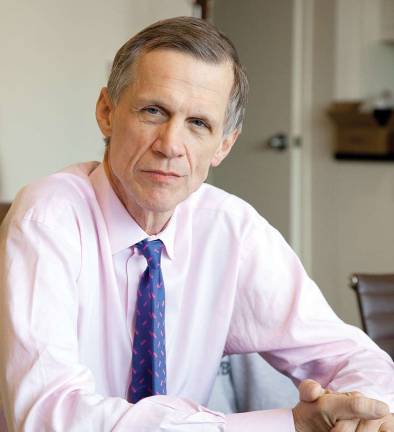Talking Up DT: President of the New School

David Van Zandt has completed his first full year as the president of The New School, and he's just getting started with his ideas for how to transform the already innovative university. Van Zandt, a graduate of Princeton, the London School of Economics and Yale Law School, practiced international banking law in New York years ago before heading out West to teach at Northwestern University School of Law, where he then served as dean from 1995 to 2010. He was lured back East to become The New School's eighth president, and we spoke to Van Zandt about his visions for the progressive school.
There is a lot of emphasis being placed on the return on investment of higher education right now, with so many students in so much debt and still unemployed. Is that a good or bad thing? In principle, it's a good thing. It can be done poorly. Higher education's gotten so expensive, and you see the state schools now that are losing the state support, they're creeping up in terms of tuition. We really have to be sure we're doing the right thing by students in providing them something of value. It's still a fact, if you have a bachelor's degree, you're much better off than if you just have a high school degree.
Who is the typical student who should come here as opposed to a more traditional college? Our real goal is to prepare students for the creative economy, creative industry. At the undergraduate level, we have to prepare the students with an excellent broad liberal arts education. But for us it's, in addition to that, focusing on the more creative side. How do you prepare people or pick people who are going to be contributors in a pretty complex world where they have to be very flexible about their careers?
Your neighbor NYU has expanded dramatically in the past decade, not just in New York but globally. Do you find yourself bumping heads occasionally? So far, I have not seen that. There's an element to which they provide us cover, in a sense. We're building a big new building there [on 14th Street and Fifth Avenue], and they're so much more ambitious in terms of space that they get more public attention.
Mayor Bloomberg and the City Council have been touting the importance of entrepreneurship, hailing tech startups and people who start their own small businesses. Will there be more focus on this from colleges? Our students already do that. A large number of our students end up having careers where they're entrepreneurial. Parsons [part of New School] is a great example of that. Our goal is really to make that connection better. I'd like to have more permeable division, or connection, with that sort of the creative economy here in New York, a lot of which is going on in Chelsea, innovative design things.
Your predecessor [former Nebraska governor and Senator Bob Kerrey] was a big personality out of the political world. What did he do well and what will you do differently? A great thing he did for this university was he began to pull it together. It was very much Balkanized, different types of activities. Bob did a great job of putting in some infrastructural elements that pulled everything together. The university grew tremendously-100 percent-during his time in terms of enrollment, and he got the university center, the new building, going. We're very different people. I'll probably focus more on the academic vision and trying to make those changes.
The New School has always had a reputation of being progressive. How important is that reputation and how do you maintain it? You have to stay on the cutting edge. There's a real danger, universities can be innovative at one point in time but they get locked into what they do. That's the real trick, to remain nimble and on your toes. We have some advantages in that our founders didn't want a traditional university. They were very much against things like full-time faculty, endowments and having buildings.
How did you handle the Occupy Wall Street movement, when one of your buildings was, for a brief time, occupied by protestors? We basically welcomed it, embraced it, not necessarily because the school was agreeing with any particular position but because it was a great educational experience. There's a tradition here of people being publicly engaged, and I think you should encourage that.
How do you want the average New Yorker to describe what the New School is? I would want them to view it as a beacon for innovation and creativity, and educating students to participate in the creative economy. I don't think [the U.S.] is going to be a traditional manufacturing country anymore. It's going to be a country where the value is going to be added by solving problems, design issues, making the world better for users in a whole variety of ways. It could be politics, it could be social organizations, it could be art, it could be physical design, environmental design. This will be the place you come to get innovative ideas to get educated with that sort of focus.